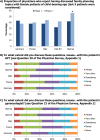Family planning and pregnancy issues for women with systemic inflammatory diseases: patient and physician perspectives
- PMID: 24500612
- PMCID: PMC3918989
- DOI: 10.1136/bmjopen-2013-004081
Family planning and pregnancy issues for women with systemic inflammatory diseases: patient and physician perspectives
Abstract
Objectives: To identify family planning and pregnancy (FPP) issues for female patients of childbearing age living with a chronic inflammatory disease and to assess whether current clinical practice routinely provides adequate support to alleviate these concerns.
Setting: Multinational survey and an analysis of online patient activity.
Participants: Premenopausal women (aged 20-45 years; N=969) were surveyed in the USA, the UK, Germany, France, Italy and Spain. Rheumatologists were surveyed in Germany (N=50), France (N=50), Italy (N=50) and the USA (N=100), and gastroenterologists were also surveyed in the USA (N=100).
Primary and secondary outcome measures: Two online surveys were undertaken to identify FPP issues for physicians and patients. The surveys examined the frequency of dialogue on these topics between physicians and patients, alongside assessment of patient satisfaction regarding these conversations. Online analysis identified key themes for patient discussion outside their doctors' office/clinic/surgery.
Results: 32-56% of physicians spontaneously reported having talked about FPP with their female patients of childbearing age. When prompted, the majority of rheumatologists (74-92%) and gastroenterologists (74%) reported having discussed conception/pregnancy with female patients; however, less than half reported consulting their patient's treating general practitioner/gynaecologist about these topics. The majority of patients reported their FPP-related concerns are not adequately addressed/settled during their medical appointments. Furthermore, only 30-40% of patients considered advice/information to be consistent across multiple healthcare professionals. Key online FPP-related patient discussions included disease state, adverse effects, treatment, switch behaviour and wash-out requirements.
Conclusions: Female patients who live with chronic inflammatory disease have important FPP concerns. The majority of patients, however, do not feel that their FPP concerns are adequately addressed in current clinical practice and report that they receive inconsistent advice from the various healthcare professionals who manage different aspects of their care. There is a clear need for provision of up-to-date and consistent information/support to female patients.
Keywords: Autoimmune disease; Family Planning; Inflammatory disease; Pregnancy.
Figures





References
-
- Symmons D, Turner G, Webb R, et al. The prevalence of rheumatoid arthritis in the United Kingdom: new estimates for a new century. Rheumatology 2002;41:793–800 - PubMed
-
- Symmons DP. Epidemiology of rheumatoid arthritis: determinants of onset, persistence and outcome. Best Pract Res Clin Rheumatol 2002;16:707–22 - PubMed
-
- Carbone LD, Cooper C, Michet CJ, et al. Ankylosing spondylitis in Rochester, Minnesota, 1935–1989. Is the epidemiology changing? Arthritis Rheum 1992;35:1476–82 - PubMed
-
- Sieper J, Braun J. Ankylosing spondylitis in clinical practice. Springer-Verlag London Limited, 2011
-
- Binder V. Epidemiology of IBD during the twentieth century: an integrated view. Best Pract Res Clin Gastroenterol 2004;18:463–79 - PubMed
Publication types
MeSH terms
LinkOut - more resources
Full Text Sources
Other Literature Sources
Medical
